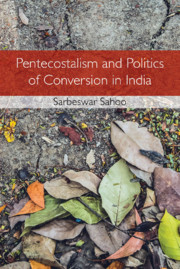Book contents
- Frontmatter
- Contents
- Foreword
- Preface
- Abbreviations
- 1 Introduction: Conversion and the Shifting Discourse of Violence
- 2 Spreading Like Fire: The Growth of Pentecostalism among Tribals
- 3 Taking Refuge in Christ: Four Narratives on Religious Conversion
- 4 Becoming Believers: Adivasi Women and the Pentecostal Church
- 5 Seen as the Alien: Hindutva Politics and Anti-Christian Violence
- 6 Conclusion: Beyond the Competing Projects of Conversion
- Endnotes
- Bibliography
- Index
6 - Conclusion: Beyond the Competing Projects of Conversion
Published online by Cambridge University Press: 05 April 2018
- Frontmatter
- Contents
- Foreword
- Preface
- Abbreviations
- 1 Introduction: Conversion and the Shifting Discourse of Violence
- 2 Spreading Like Fire: The Growth of Pentecostalism among Tribals
- 3 Taking Refuge in Christ: Four Narratives on Religious Conversion
- 4 Becoming Believers: Adivasi Women and the Pentecostal Church
- 5 Seen as the Alien: Hindutva Politics and Anti-Christian Violence
- 6 Conclusion: Beyond the Competing Projects of Conversion
- Endnotes
- Bibliography
- Index
Summary
The book began with a discussion of the history and nature of Pentecostalism in India and examined the strategies and methods used by Pentecostals in spreading the Gospel among the Bhil tribes of Rajasthan. The book showed that Pentecostalism in India has largely been a religion of the poor, and specifically in the case of south Rajasthan it has emerged as predominantly a ‘tribal religion’. It has provided a new identity to tribal men and women, making them feel empowered and self-assured. The tribal converts consider this newly acquired identity superior to that of their Hindu counterparts. For them, while the pre-conversion stage represents slavery and lack of freedom, the post-conversion stage is marked by freedom and progress; conversion has made them free of bondage, ignorance and discrimination. For the converts, the Pentecostal church has provided an egalitarian space for all, without discriminating against anyone. It is in the church that the converts feel equal in the eyes of the Lord; it is where they sit, pray and eat together as a community of believers. In a sense, Pentecostalism has helped adivasis to convert to ‘modernities’.
The tribals have found the spirit of Pentecostalism attractive, and a large number of them have converted to it in the past two decades. In the Indian context, one dominant explanation regarding conversion is that tribals and other marginalised population convert to Christianity because of material incentives or promises of social and economic benefits. In contrast, this book showed that the growth of Pentecostalism among tribal men and women needs an explanation that goes beyond the ‘materialist incentive discourse’. I argued that religious conversion is a complex and contingent process and cannot be fully explained by short-term material gains and incentives. This, however, should not mean that material incentives do not play any role in the conversion discourse. The book demonstrated that some tribals converted because of internal spiritual transformation, some converted to escape the exploitative shamanic system, some converted in the hope of having a better future and some others converted purely for material gains. Regardless, conversion is considered an integral aspect of Pentecostalism; thus there have been deliberate attempts from Pentecostals to spread the Gospel among the unreached population.
- Type
- Chapter
- Information
- Pentecostalism and Politics of Conversion in India , pp. 158 - 164Publisher: Cambridge University PressPrint publication year: 2018



